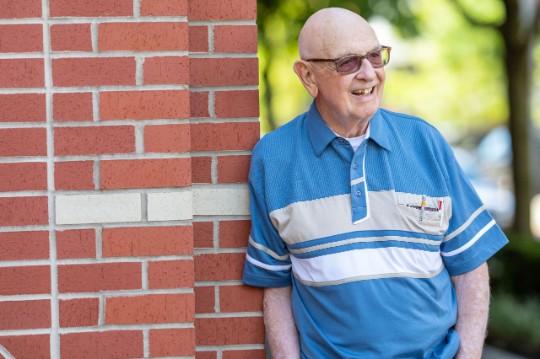Mal's story - Bristol Myers Squibb - Our stories
Our patients

Mal
A medium coffee, hot, with lots of cream. Sweetened with one packet of raw sugar that he brings from home. One plain doughnut, nothing fancy.
Mal Doyle’s daily coffee order at his local doughnut shop brings him joy — it’s what compels him to swing his legs out of bed in the morning and face the day. Having something to look forward to each day is crucial to his mental health, he says, and it’s the advice he most often gives to patients like him who are living with idiopathic pulmonary fibrosis (IPF), a disease of the lungs for which there is no cure.
In 2018, Mal was diagnosed with IPF, the most common type of pulmonary fibrosis and an area of significant unmet medical need, affecting approximately 700,000 people worldwide. The disease is fatal, as it causes lung tissue to become thickened, scarred and stiff, leading to irreversible lung damage, severe breathing difficulties, and ultimately, respiratory failure. The survival rate for this disease is typically 3-4 years from diagnosis.
 |
What frustrates me most about this disease is that nobody thinks we’re sick. We all look well, we act well. But if you ask me to walk one block, you’ll see what I go through every day.” |
Even the simplest of activities can cause Mal to gasp for breath. “We have to chase our breath and hope we catch it,” he said. He starts each day early, but by lunchtime, he is utterly exhausted.
Currently approved therapies do not stop the decline of lung function and are associated with burdensome side effects, often leading to discontinuation of treatment. The high need for treatment for IPF and stories of patients like Mal propel scientists at Bristol Myers Squibb to drive research forward.
One particular asset in our pipeline is showing great promise: BMS-986278, a second-generation lysophosphatidic acid receptor 1 (LPA1) antagonist, discovered in-house by our scientists and currently being studied for pulmonary fibrosis. Research has shown that increased LPA levels and activation of LPA1 are associated with the development cause of pulmonary fibrosis. Lung injury stimulates LPA production, ultimately leading to fibrosis that reduces functioning of the lungs.
In 2022, the data from the BMS-986278 Phase 2 trial convinced the company to move the program into Phase 3 in 2023.
Pulmonary fibrosis can make breathing almost impossible. Most patients are not like Mal. Many living with IPF are physically impaired, wheelchair-bound with an inability to perform even simple daily activities due to profound breathlessness. They also require continuous supplemental oxygen to ease the burden of simply breathing.
But Mal is a man about town. At 85 years young, he tries to stay active, and while most days it’s a struggle, he has important work to do.
Mal leads a support group for people living with IPF in his hometown of West Hartford, Connecticut, through his involvement with the Pulmonary Fibrosis Foundation. Despite his limitations, once a month, Mal lugs heavy equipment to the local senior center to conduct hybrid meetings for the group.

 |
The support group is healthy for me — I think it’s important for people to talk to one another. We need to talk about our disease, what we go through every day, what our fears and hopes are. It also helps me realize that all of us have a different journey with this disease.” |
In the coming years, as our scientists work to find solutions, Mal worries more about their wellbeing than his own.
“I know that they’re working tirelessly to find a cure,” Mal said. They're the ones who go home at night discouraged. And they’ve got to find enough ‘oomph’ to come back to work and turn all of that doom and gloom into positivity the next morning. But to the scientists I say, ‘Don’t get discouraged. Keep doing what you’re doing.’”
Until the time comes when there are more options for patients like Mal, he’ll continue to rally behind our scientists and their work – and look forward to his regular hot coffee with one packet of raw sugar and a plain doughnut, every morning.